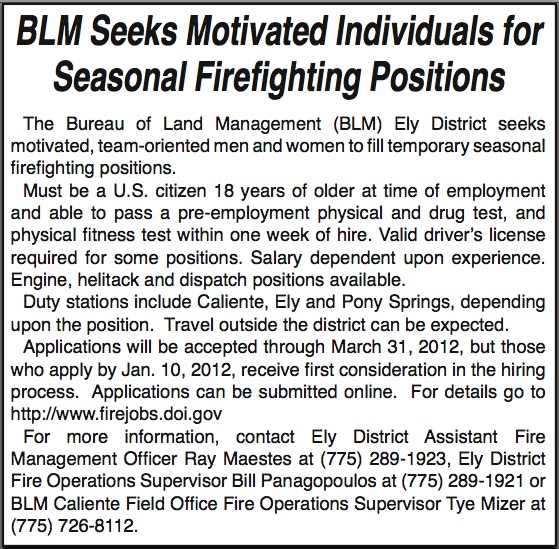[media id=13 width=320 height=240]
New laws and regulations legalizing some forms of internet gaming could be a boon to large Nevada based gaming corporations but a bust for the proverbial border boom towns such as Wendover.
This week the Nevada Gaming control Board unanimously approved rules that allow companies in the state apply for licenses to operate poker websites.
[media id=1 width=320 height=240]
“We estimate the U.S. online poker market at $5 billion in revenue, relative to the current $24 billion global Internet gaming market and (the) $33 billion commercial casino market in the U.S.,” Union Gaming Group analyst Bill Lerner wrote in a research report. “In our opinion, the commercialization of online poker is a 2013 event.”
The Las Vegas Review-Journal reports that some sites could begin operating by the end of 2012.
The guidelines were mandated by the state Legislature’s approval of Assembly Bill 258 earlier this year, which dictated that Internet poker regulations be established by Jan. 31.
 Licensed gaming companies seeking online poker licenses will have to prove that their technology will be able to limit play to state residents of a legal age. Online poker sites are also required to establish procedures to detect money laundering, fraud or other criminal activities, and to establish a cash reserve to complement money deposited by customers in their accounts.
Licensed gaming companies seeking online poker licenses will have to prove that their technology will be able to limit play to state residents of a legal age. Online poker sites are also required to establish procedures to detect money laundering, fraud or other criminal activities, and to establish a cash reserve to complement money deposited by customers in their accounts.
Caesars Entertainment Corp. and Boyd Gaming Corp. have already submitted proposals to be licensed once regulations are ready, along with casino equipment manufacturers such as International Game Technology, Bally Technologies Inc. And Cantor Gaming.
According to the regulations, companies new to Nevada would be vetted with full licensing investigations, which usually take several months.
Casino industry representatives applauded the vote despite online poker being illegal in the United States.
 The federal Unlawful Internet Gambling Enforcement Act of 2006 prohibits companies from accepting payments related to online wagering, but allows several exceptions, including intrastate wagering and fantasy sports.
The federal Unlawful Internet Gambling Enforcement Act of 2006 prohibits companies from accepting payments related to online wagering, but allows several exceptions, including intrastate wagering and fantasy sports.
However earlier this week the Obama administration cleared the way for states to legalize Internet poker and certain other online betting in a switch that may help them reap billions in tax revenue and spur web-based gambling.
A Justice Department opinion dated September and made public on Friday reversed decades of previous policy that included civil and criminal charges against operators of some of the most popular online poker sites.
Until now, the department held that online gambling in all forms was illegal under the Wire Act of 1961, which bars wagers via telecommunications that cross state lines or international borders.
The new interpretation, by the department’s Office of Legal Counsel, said the Wire Act applies only to bets on a “sporting event or contest,” not to a state’s use of the Internet to sell lottery tickets to adults within its borders or abroad.
“The United States Department of Justice has given the online gaming community a big, big present,” said I. Nelson Rose, a gaming law expert at Whittier Law School who consults for governments and the industry.
 The question at issue was whether proposals by Illinois and New York to use the Internet and out-of-state transaction processors to sell lottery tickets to in-state adults violated the Wire Act.
The question at issue was whether proposals by Illinois and New York to use the Internet and out-of-state transaction processors to sell lottery tickets to in-state adults violated the Wire Act.
 But the department’s conclusion would eliminate “almost every federal anti-gambling law that could apply to gaming that is legal under state laws,” Rose wrote on his blog at www.gamblingandthelaw.com.
But the department’s conclusion would eliminate “almost every federal anti-gambling law that could apply to gaming that is legal under state laws,” Rose wrote on his blog at www.gamblingandthelaw.com.
If a state legalized intra-state games such as poker, as Nevada and the District of Columbia have done, “there is simply no federal law that could apply” against their operators, he said.
 The department’s opinion, written by Assistant Attorney General Virginia Seitz, said the law’s legislative history showed that Congress’s overriding goal had been to halt wire communications for sports gambling, notably off-track betting on horse races.
The department’s opinion, written by Assistant Attorney General Virginia Seitz, said the law’s legislative history showed that Congress’s overriding goal had been to halt wire communications for sports gambling, notably off-track betting on horse races.
Congress also had been concerned about rapid transmission of betting information on baseball, basketball, football and boxing among other sports-related events or contests, she summarized the legislative history as showing.
“The ordinary meaning of the phrase ‘sporting event or contest’ does not encompass lotteries,” Seitz wrote. “Accordingly, we conclude that the proposed lotteries are not within the prohibitions of the Wire Act.”
 The department expressed no opinion about a provision in the law that lets prosecutors shut down phone lines where interstate or foreign gambling is taking place.
The department expressed no opinion about a provision in the law that lets prosecutors shut down phone lines where interstate or foreign gambling is taking place.
Many of the 50 U.S. states may be interested in creating online lotteries to boost tax revenues and help offset the ripple effect of a federal deficit-reduction push.
 The global online gambling industry grew 12 percent last year to as much as $30 billion, according to a survey in March by Global Betting and Gaming Consultancy, based on the Isle of Man, where online gambling is legal.
The global online gambling industry grew 12 percent last year to as much as $30 billion, according to a survey in March by Global Betting and Gaming Consultancy, based on the Isle of Man, where online gambling is legal.
But while the changes are being lauded in Las Vegas smaller casino operators are not as optimistic.
 “We don’t need anymore competition especially now,” said one local casino executive. “Our market is the day tripper or the people who come out for the weekend. A lot of them have a fixed gaming budget. If they can gamble on line from their homes in Salt Lake we could lose a nice chunk of our business.”
“We don’t need anymore competition especially now,” said one local casino executive. “Our market is the day tripper or the people who come out for the weekend. A lot of them have a fixed gaming budget. If they can gamble on line from their homes in Salt Lake we could lose a nice chunk of our business.”


